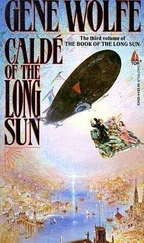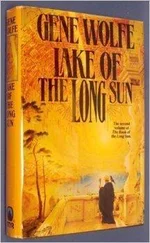Wolfe, Gene - The Best of Gene Wolfe
Здесь есть возможность читать онлайн «Wolfe, Gene - The Best of Gene Wolfe» весь текст электронной книги совершенно бесплатно (целиком полную версию без сокращений). В некоторых случаях можно слушать аудио, скачать через торрент в формате fb2 и присутствует краткое содержание. Жанр: Старинная литература, на английском языке. Описание произведения, (предисловие) а так же отзывы посетителей доступны на портале библиотеки ЛибКат.
- Название:The Best of Gene Wolfe
- Автор:
- Жанр:
- Год:неизвестен
- ISBN:нет данных
- Рейтинг книги:5 / 5. Голосов: 1
-
Избранное:Добавить в избранное
- Отзывы:
-
Ваша оценка:
- 100
- 1
- 2
- 3
- 4
- 5
The Best of Gene Wolfe: краткое содержание, описание и аннотация
Предлагаем к чтению аннотацию, описание, краткое содержание или предисловие (зависит от того, что написал сам автор книги «The Best of Gene Wolfe»). Если вы не нашли необходимую информацию о книге — напишите в комментариях, мы постараемся отыскать её.
The Best of Gene Wolfe — читать онлайн бесплатно полную книгу (весь текст) целиком
Ниже представлен текст книги, разбитый по страницам. Система сохранения места последней прочитанной страницы, позволяет с удобством читать онлайн бесплатно книгу «The Best of Gene Wolfe», без необходимости каждый раз заново искать на чём Вы остановились. Поставьте закладку, и сможете в любой момент перейти на страницу, на которой закончили чтение.
Интервал:
Закладка:
I told her I supposed they had transplanted the extra pair after suppressing his body’s natural resistance to the implanted foreign tissue and that the operation had probably replaced some of his ribs with the donor’s shoulder structure. “I’ve been teaching myself to do the same sort of thing with mice—on a much less ambitious scale, of course—and the striking thing to me is that he seems to have full use of the grafted pair. Unless you’ve got identical twins to work with, the nerve endings almost never join properly, and whoever did this probably had a hundred failures before he got what he wanted. That slave must be worth a fortune.”
David said, “I thought you threw your mice out. Aren’t you working with monkeys now?”
I wasn’t, although I hoped to, but whether I was or not, it seemed clear that talking about it wasn’t going to accomplish anything. I told David that.
“I thought you were hot to leave.”
I had been, but now I wanted something else much more. I wanted to perform an exploratory operation on that creature much more than David or Phaedria had ever wanted money. David liked to think that he was bolder than I, and I knew when I said, “You may want to get away, but don’t use me as an excuse, Brother,” that that would settle it.
“All right, how are we going to kill him?” David gave me an angry look.
Phaedria said: “He can’t reach us. We could throw things at him.”
“And he could throw the ones that missed back.”
While we talked, the thing, the four-armed slave, was grinning at us. I was fairly sure he could understand at least a part of what we were saying, and I motioned to David and Phaedria to indicate that we should go back into the room where the desk was. When we were there I closed the door. “I didn’t want him to hear us. If we had weapons on poles, spears of some kind, we might be able to kill him without getting too close. What could we use for the sticks? Any ideas?”
David shook his head, but Phaedria said, “Wait a minute; I remember something.” We both looked at her and she knitted her brows, pretending to search her memory and enjoying the attention.
“Well?” David asked.
She snapped her fingers. “Window poles. You know, long things with a little hook on the end. Remember the windows out there where he talks to customers? They’re high up in the wall, and while he and Papa were talking one of the men who works for him brought one and opened a window. They ought to be around somewhere.”
We found two after a five-minute search. They looked satisfactory: about six feet long and an inch and a quarter in diameter, of hardwood. David flourished his and pretended to thrust at Phaedria, then asked me, “Now what do we use for points?”
The scalpel I always carried was in its case in my breast pocket, and I fastened it to the rod with electrical tape from a roll David had fortunately carried on his belt instead of in the tool kit, but we could find nothing to make a second spear-head for him until he himself suggested broken glass.
“You can’t break a window,” Phaedria said. “They’d hear you outside. Besides, won’t it just snap off when you try to get him with it?”
“Not if it’s thick glass. Look here, you two.”
I did, and saw—again—my own face. He was pointing toward the large mirror that had surprised me when I came down the steps. While I looked his shoe struck it, and it shattered with a crash that set the dogs barking again. He selected a long, almost straight, triangular piece and held it up to the light, where it flashed like a gem. “That’s about as good as they used to make them from agate and jasper on Sainte Anne, isn’t it?”
B
y prior agreement we approached from opposite sides. The slave leaped to the top of the chest and, from there, watched us quite calmly, his deep-set eyes turning from David to me until at last, when we were both quite close, David rushed him.
He spun around as the glass point grazed his ribs and caught David’s spear by the shaft and jerked him forward. I thrust at the slave but missed, and before I could recover he had dived from the chest and was grappling with David on the far side. I bent over it and jabbed down at the slave, and it was not until David screamed that I realized I had driven my scalpel into his thigh. I saw the blood, bright arterial blood, spurt up and drench the shaft, and let it go and threw myself over the chest on top of them.
The slave was ready for me, on his back and grinning, with his legs and all four arms raised like a dead spider’s. I am certain he would have strangled me in the next few seconds if it had not been that David, how consciously I do not know, threw one arm across the creature’s eyes so that he missed his grip and I fell between those outstretched hands.
T
here is not a great deal more to tell. He jerked free of David and, pulling me to him, tried to bite my throat, but I hooked a thumb in one of his eye sockets and held him off. Phaedria, with more courage than I would have credited her with, put David’s glass-tipped spear into my free hand and I stabbed the slave in the neck—I believe I severed both jugulars and the trachea before he died. We put a tourniquet on David’s leg and left without either the money or the knowledge of technique I had hoped to get from the body of the slave. Marydol helped us get David home, and we told Mr. Million he had fallen while we were exploring an empty building—though I doubt that he believed us.
There is one other thing to tell about that incident—I mean the killing of the slave—although I am tempted to go on and describe instead a discovery I made immediately afterward that had, at the time, a much greater influence on me. It is only an impression, and one that I have, I am sure, distorted and magnified in recollection. While I was stabbing the slave, my face was very near his and I saw (I suppose because of the light from the high windows behind us) my own face reflected and doubled in the corneas of his eyes, and it seemed to me that it was a face very like his. I have been unable to forget, since then, what Dr. Marsch told me about the production of any number of identical individuals by cloning, and that my father had, when I was younger, a reputation as a child broker. I have tried since my release to find some trace of my mother, the woman in the photograph shown me by my aunt, but that picture was surely taken long before I was born—perhaps even on Earth.
The discovery I spoke of I made almost as soon as we left the building where I killed the slave, and it was simply this: that it was no longer autumn, but high summer. Because all four of us—Marydol had joined us by that time—were so concerned about David and busy concocting a story to explain his injury, the shock was somewhat blunted, but there could be no doubt of it. The weather was warm with that torpid, damp heat peculiar to summer. The trees I remembered nearly bare were in full leaf and filled with orioles. The fountain in our garden no longer played, as it always did after the danger of frost and burst pipes had come, with warmed water: I dabbled my hand in the basin as we helped David up the path, and it was as cool as dew.
My periods of unconscious action then, my sleepwalking, had increased to devour an entire winter and the spring, and I felt that I had lost myself.
When we entered the house, an ape which I thought at first was my father’s sprang to my shoulder. Later Mr. Million told me that the ape was my own, one of my laboratory animals I had made a pet. I did not know the little beast, but scars under his fur and the twist of his limbs showed he knew me.
(I have kept Popo ever since, and Mr. Million took care of him for me while I was imprisoned. He climbs still in fine weather on the gray and crumbling walls of this house; and as he runs along the parapets and I see his hunched form against the sky, I think, for a moment, that my father is still alive and that I may be summoned again for the long hours in his library—but I forgive my pet that.)
Читать дальшеИнтервал:
Закладка:
Похожие книги на «The Best of Gene Wolfe»
Представляем Вашему вниманию похожие книги на «The Best of Gene Wolfe» списком для выбора. Мы отобрали схожую по названию и смыслу литературу в надежде предоставить читателям больше вариантов отыскать новые, интересные, ещё непрочитанные произведения.
Обсуждение, отзывы о книге «The Best of Gene Wolfe» и просто собственные мнения читателей. Оставьте ваши комментарии, напишите, что Вы думаете о произведении, его смысле или главных героях. Укажите что конкретно понравилось, а что нет, и почему Вы так считаете.









